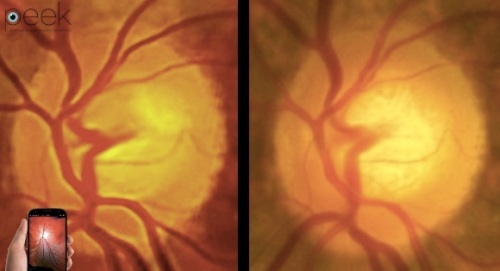The team behind Peek, the Portable Eye Examination Kit, are calling on the public to help provide a solution to avoidable blindness by increasing access to potentially life-changing new eye health testing equipment.

Comparison of image recorded by Peek Retina on the left with £25,000 camera on the right. Credit: Peek
Peek consists of smartphone apps and an adapter which can be used by health workers anywhere in the world to test eyes easily and affordably in the community. This is especially important as millions of people around the world are not able to get to clinics or hospitals to seek help.
The tools are being developed as a collaboration between the London School of Hygiene & Tropical Medicine, the University of Strathclyde and the NHS Glasgow Centre for Ophthalmic Research, pooling their complementary expertise in international eye health, biomedical engineering and ophthalmic research.
Their latest creation is called Peek Retina, a smartphone adapter engineered at the University of Strathclyde and NHS Greater Glasgow and Clyde which clips over the phone’s camera and enables health workers to see inside the eye, save the photos and then send them to experts for diagnosis and subsequent treatment. Many eye diseases and other health problems, such as diabetes and high blood pressure, can be detected with a good view of the retina.
Peek Retina’s unique features - which will complement Peek’s freely available intuitive apps and software - are grounded in scientific expertise, producing high-quality images which compare favourably with traditional ophthalmoscopes and far more expensive, bulky retinal cameras.
Crowdfunding site Indiegogo is now offering a way of raising additional funding to enable manufacture and delivery of Peek tools on a global scale to the people who need it most. Peek aims to develop mobile-based versions of everything needed for a comprehensive eye exam, empowering health workers to find people with eye problems which could be cured or prevented with treatment.
People can go to www.supportpeek.com and buy Peek Retina for their own use, or pledge funds to enable the adapter to be manufactured and distributed to suitable low-income settings.
Millions of people worldwide are blind, and 80% of all blind people have needlessly lost their sight through preventable or treatable conditions. With so much avoidable vision loss occurring, the Peek team shares a passion for developing affordable, portable and easy-to-use tools to reach the people who need eye care most.
Frequently, it is populations with the greatest need that have the least access to care. Peek also has major potential in the developed world as a hi-tech mobile option for hospitals and clinics.
Peek was formed after co-founder Dr Andrew Bastawrous experienced a logistical nightmare trying to transport bulky eye equipment to remote areas in Kenya during a community study as part of his PhD at the London School of Hygiene & Tropical Medicine. He was convinced there must be a better way and turned his attention to the potential power of smartphones, teaming up with his fellow Peek co-founders, Stewart Jordan, Dr Mario Giardini and Dr Iain Livingstone, to make the idea a reality.
In 2013, Peek received funding from The Queen Elizabeth Diamond Jubilee Trust towards the research and development of Peek and, thanks to the Trust’s support, the team are conducting a pioneering series of trials over the next five years to test the technology in various settings and communities including Kenya, Mali, Tanzania, Botswana, Malawi, India and the UK.
All elements of Peek’s tools, including Peek Retina, are designed and tested against the highest standards of academic scrutiny with a focus on quality, reliability and usability. Further investment from the public will enable Peek to increase the scope and reach of its work by getting the tools manufactured and distributed.
Dr Giardini, Lecturer in the Department of Biomedical Engineering at the University of Strathclyde, said:
Peek Retina is the optimal combination of solid engineering experience, ingenuity and outlook to social impact. The Peek Retina adapter is the most exciting thing my group has ever designed; it is incredibly simple and yet it will change the way we look at eyes.
This is a fantastic project for the University of Strathclyde to be involved in and the success of Peek demonstrates the benefit of working in collaboration to ensure cutting edge engineering research has an impact on wider society.
Dr Iain Livingstone, an ophthalmologist and Research Fellow based at the NHS Glasgow Centre for Ophthalmic Research, said: "With Peek Retina, imaging can be performed with minimal training using a smartphone. We hope that in the near future, integration of Peek Retina with computerised grading systems will bring high quality screening to resource poor settings, detecting such blinding conditions as diabetic eye disease, helping connect patients with treatment."
Dr Bastawrous, who is a Clinical Lecturer and ophthalmologist within the International Centre for Eye Health at the London School of Hygiene & Tropical Medicine, said: “With Peek we are hoping to increase the access to eye care to the millions of people who are blind and shouldn’t be. For this to be a success we need to find a sustainable way of sharing the technology as far and wide as possible.
“There are so many hard-working and excellent eye care workers in hospitals and charities worldwide and one of the greatest challenges they face is getting expertise and diagnostic tools to remote locations – we hope Peek will support their efforts to alleviate unnecessary sight loss.”
Stewart Jordan, Software Developer at the London School of Hygiene & Tropical Medicine, said:
From the beginning, Peek has been designed in collaboration with healthcare workers in Kenya and the UK to ensure that it works where it’s needed, not just in a lab. It’s easy to use and integrates into existing systems, complementing the amazing work that is already happening, not replacing it.